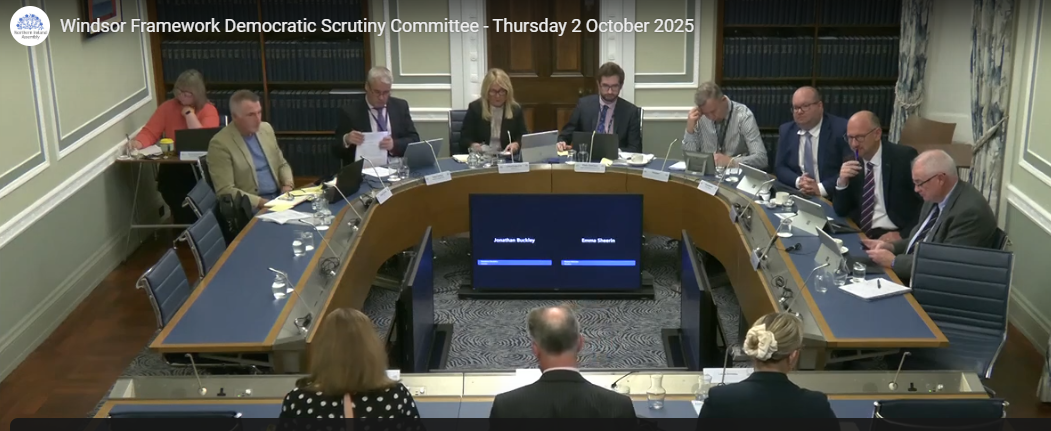Brexit & Beyond newsletter
06 October 2025
Welcome to the 6 October 2025 Brexit & Beyond newsletter
This week we take a look at the Windsor Framework Democratic Scrutiny Committee’s evidence session with the Federation of Small Businesses Northern Ireland as well as the first evidence session of the Scottish Parliament’s Constitution, Europe, External Affairs and Culture Committee inquiry on ‘Transparency of Intergovernmental activity and its implications for parliamentary scrutiny’.
We highlight the seventh meeting of the European Political Community (EPC) which took place on last week in Copenhagen and take a closer look at The Competitions and Markets Authority (CMA) final recommendation to replace the assimilated EU Technology Transfer Block Exemption Regulation (TTBER) with a new UK specific Order. Plus, we link through to some of this week’s updates and news stories that you may have missed.
As always, we appreciate feedback from our readers – so if you have any comments on this edition or have ideas for future content, you can email us at info@brexitandbeyond.niassembly.gov.uk
- Windsor Framework Democratic Scrutiny Committee takes evidence from Federation of Small Businesses
- Scottish Parliament Committee takes evidence on Intergovernmental Relations
- European Political Community Holds Autumn Summit in Copenhagen
- Competitions and Markets Authority Publishes Final Recommendation to Replace the Assimilated Technology Transfer Block Exemption Order
- In case you missed it...
Windsor Framework Democratic Scrutiny Committee takes evidence from Federation of Small Businesses
Last Thursday, the Windsor Framework Democratic Scrutiny Committee (DSC) took evidence from the Federation of Small Businesses Northern Ireland (FSB) on its recent report ‘Windsor Framework Realities - Barriers to trade in the UK Internal Market’.

The report, which was published in June, includes findings from the FSB’s UK-wide business survey and makes a series of recommendations to the UK Government, Northern Ireland Executive, and their relevant agencies, which aim to “reduce friction, restore business confidence, and unlock the Windsor Framework’s intended economic benefits.” The FSB also presented the report to the Committee for the Economy in July – you can watch that evidence session here.
Chairperson of the DSC, Ciara Ferguson MLA, noted that the Committee for the Economy had already explored the elements of the report which fall within its remit and therefore the DSC would explore its findings and recommendations in so far as they relate to its own specific statutory role and work. Topics discussed included the FSB’s call for businesses to have access to clear and concise information on UK-EU trade rules, and its recommendation for improved monitoring and interpretation of regulatory divergence.
The Committee agreed that it would forward a copy of the Official Report from the evidence session to the UK Government, noting that a number of recommendations within the FSB’s report could potentially impact the level of information available to the Committee when considering proposed and published EU acts within its scope. The Committee also agreed to forward a copy of the Official Report to the Committee for the Economy and the House of Lords Northern Ireland Scrutiny Committee.
You can watch the full evidence session here.
Scottish Parliament Committee takes evidence on Intergovernmental Relations
On Thursday, the Scottish Parliament’s Constitution, Europe, External Affairs and Culture Committee held its first evidence session as part of its Transparency of Intergovernmental activity and its implications for parliamentary scrutiny inquiry.
The inquiry is considering the effectiveness and development of formal intergovernmental structures, the UK Government’s intergovernmental relations reset, and the transparency of informal cooperation. It will also assess the potential consequences of insufficient scrutiny, especially in relation to common frameworks, the UK Internal Market Act 2020, and evolving UK/EU agreements.
The inquiry will consider the implications for legislative consent and delegated powers as well as exploring how inter-parliamentary collaboration can enhance oversight and accountability.
Regarding the UK Government’s intergovernmental relations reset, Professor Nicola McEwan, Professor of Public Policy at the University of Glasgow, told the committee that the reset in relations is an evolving process rather than an event. She and Dr Paul Anderson, Senior Lecturer in International Relations and Politics at Liverpool John Moores University, agreed that there has been a cultural shift, noting a more optimistic and co-operative tone from UK government ministers but suggested this would only take matters so far.
The Committee then considered the influence of political culture on how intergovernmental relations function in practice. Professor Thomas Horsley, Professor of Law at the University of Liverpool, commented that politics is an inherent part of intergovernmental relations and not unique to devolution in Scotland. However, he stressed that the system in the UK is comparatively weakly institutionalised: it is non-statutory and relies heavily on the quality of political relationships.
He noted that, since Brexit, there has been a shift towards using intergovernmental relations as a space for policy-making, citing the internal market as one example. He suggested this trend poses structural challenges to the legislative competence of the Scottish Parliament.
Professor Colin Reid, Professor of Public and Environmental Law at the University of Dundee, noted that, from a practical perspective, mismatched parliamentary schedules and cycles can cause significant disruption to the operation of existing intergovernmental relations mechanisms.
The Committee also discussed the Dunlop Review (2021) into the UK Government’s Union capability, common frameworks, transparency and interparliamentary relations.
You can watch the meeting here.
European Political Community Holds Autumn Summit in Copenhagen

The seventh meeting of the European Political Community (EPC) took place on the 2 October in Copenhagen. Founded in 2022, the EPC brings together leaders from across the continent on a biannual basis with the focus on strengthening links and increasing cooperation in a number of areas including security, energy, peace and climate.
The autumn 2025 summit opened with a plenary session and was followed by roundtable discussions on traditional and hybrid security threats, economic security and migration with discussions centring upon how to strengthen Ukraine and on the general security situation in Europe.
Prior to the summit, the UK Prime Minister, Sir Keir Starmer met with the NATO Secretary General Mark Rutte to discuss recent developments on Ukraine and with Prime Minister Jonas Gahr Støre of Norway where they reflected on “the thriving and fast-growing partnership between their two countries”. Further information on the summit can be found here.
Competitions and Markets Authority Publishes Final Recommendation to Replace the Assimilated Technology Transfer Block Exemption Order

On 30 September, the Competitions and Markets Authority (CMA) published its final recommendation that the Secretary of State for Business and Trade replace the assimilated (formally known as retained EU law) EU Technology Transfer Block Exemption Regulation (TTBER), when it expires on 30 April 2026, with a new (UK specific) Order. The recommendation follows a CMA consultation with industry and legal stakeholders.
The TTBER allows companies to share and license technology, such as patents or software, under certain conditions without breaching competition law. Reuters reports that: “The CMA said the proposed changes would give businesses greater clarity and flexibility, while ensuring that licensing deals do not harm competition.”
While the CMA has recommended that the new order should include the same definitions, conditions and obligations as the ‘Assimilated TTBER’, it is proposing some key changes which include more flexible alternatives to testing companies market share and adding definitions of ‘active sales’ and ‘passive sales’. The CMA is also recommending a 12-year lifespan for the new order, with a transition period for existing agreements.
You can read the CMA’s full review and recommendation here:
In case you missed it...
- The Tánaiste Simon Harris delivered a speech at the British Irish Chamber of Commerce Conference on 2 October, where he discussed EU-UK relations and the Windsor Framework.
- Before the start of the EU carbon border adjustment mechanism (CBAM) definitive period on 1 January 2026, The I Paper reports that UK Minister for the Constitution and European Union Relations, Nick Thomas-Symonds, will ask the European Commission for a temporary exemption, with Chancellor of the Exchequer Rachel Reeves reportedly concerned about the potential impact on UK firms.
- The Cabinet Office has published a new policy paper from the UK-EU Trade and Cooperation Agreement Civil Society Forum 2025 which took place in London and online on 24 June.
- UK-Greenland trade deal talks resume.
- UK-Japan Industrial Strategy Partnership Update.
- Sebastien Lecornu, the seventh prime minister of Emmanuel Macron’s presidency has resigned after less than one month in the role.





